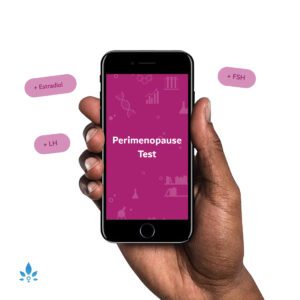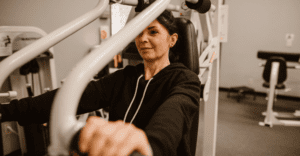Menopause: The Symptoms Nobody Talks About


The menopause is a time of change. Typically occurring between the ages of 45 and 55, it is the time at which a female stops having her monthly periods. Whilst some women relish their postmenopausal years, freed from the constraints of monthly menstruation and constant fertility awareness; for others, it can be a difficult stage to navigate, dealing with a plethora of associated symptoms and, perhaps, facing up to their own mortality for the first time.
The symptoms that are associated with the menopause usually start during the perimenopause. This is the time before menopause, when a female’s periods become increasingly irregular. There are symptoms that are widely accepted as being synonymous with the menopause, for example hot flushes, difficulty sleeping, reduced libido and vaginal dryness. These symptoms are common and, whilst it probably comes as little comfort to those in the midst of it, usually subside in the years following the menopause.
There are other symptoms too though; symptoms that are either not as well understood, or not quite as strongly associated as some of the aforementioned. In fact, there are thought to be more than 30 menopausal symptoms. Three out of four women report experiencing symptoms of the menopause, but as not all of the associated symptoms are well known, it is likely that the true number of women affected by the menopause is actually even higher.
We wanted to take the time to highlight some of the lesser known symptoms, particularly as they bring with them physical and emotional changes that can have a large impact on quality of life during the menopausal years.
Brain fog
Brain fog refers to the decline in cognitive function that many women experience during their menopause. Usually manifesting as memory problems and an inability to concentrate; some women struggle to remember the right words at the right time, or find themselves attempting to use their car key zapper to enter their house. It can be quite a frightening experience, especially when paired with the worry that it might be an early sign of dementia.
The reason for menopausal brain fog is not well understood. Suggestions that it is associated with declining oestrogen levels and/or impaired sleep patterns, sounded good in theory (oestrogen directly affects the parts of the brain involved in brain function and verbal memory); however, experimental studies have not supported these hypotheses. One study that found more pronounced cognitive impairment in the early stages of the menopause, suggested that it was fluctuating oestrogen levels, rather than an absolute decline, that was causing the issues.
Fatigue
Fatigue, or a lack of energy and feeling of overwhelming tiredness, is another symptom of the menopause. 44-65% of menopausal women report feeling fatigued. Perhaps this is of little surprise, given the high proportion of women suffering from night sweats and disrupted sleep. Unfortunately, fatigue is strongly associated with emotional negativity, meaning that those who are experiencing fatigue are more likely to experience feelings of depression and anxiety. Fatigue has also been shown to be associated with brain fog.
Mood swings and anxiety
Mood changes are a frequently observed consequence of the menopause, but are often given very little consideration. All too often mood swings are thought to be the plight of the young; a defining feature of that other time of huge hormonal upset, puberty. However, mood swings regularly reappear during the menopausal years, and whilst women at this stage may be older and wiser in many ways, they are just as susceptible to the emotional effects of fluctuating hormones as their younger selves.
Furthermore, aside from their hormones, women at this stage of life often have many things to consider; their children ‘flying the nest’, elderly parents, increasing work commitments and responsibilities. Pair this with some of the physical symptoms of the menopause, such as hot flushes and night sweats, and it is easy to see why the rates of anxiety-based disorders amongst women in their 40s and 50s are increased compared to the rates in younger women. Anxiety and panic attacks are two of the major mental health issues that can affect menopausal women.
Hair loss and weight gain
Not all women mourn the passing of their fertile years; as mentioned previously, for some it almost certainly comes as a relief. However, for others it is difficult to come to terms with the knowledge that those years are behind them. As women, having periods is what defines us, it is one of the main things that separates us from men. In an article written by women, for women, let’s be honest, it is what makes us special. It is something that we have lived with and managed for the preceding 25 years or so. Change and the loss of a physiological norm should always be considered a potential source of emotional challenge.
Now consider that on top of this emotional upheaval, many women at this stage also have to deal with unwanted physical changes. Up to two thirds of menopausal women experience hair thinning or bald spots. Many women see their stores of adipose tissue rise and as a result gain unwanted body fat. These are changes that would be unwelcome at the best of times, but when they affect those who are already feeling emotionally vulnerable, they can be particularly hard to manage.
Immune dysfunction
Aging brings with it ‘immune senescence’, in other words a reduced ability to manage infections. This happens to males and females, but seems to be exacerbated in menopausal women, who become particularly susceptible to an impaired immune response in their reproductive tract, increasing the risk of urinary tract infections (UTI). 10-15% of those aged 60 and over experience recurrent UTIs, most likely due to an altered vaginal microbiome (the growth of different bacterial species in the lining of the vagina) in postmenopausal women.
Managing the menopause
The menopause cannot be ‘cured’, it is an inevitable stage of life. However, there are steps that can be taken to provide relief from some of the unwanted symptoms. The most widely known is almost certainly Hormone Replacement Therapy (HRT) and this is probably the singularly most effective way of minimising hot flushes; but HRT has side effects and its long-term use is not recommended due to an association with blood clots and breast cancer. Instead, you may wish to consider certain lifestyle adjustments and home remedies that seem to improve some of the symptoms of the menopause:
- Identify triggers and avoid them. You might find alcohol, or caffeine, or stress are making your hot flushes and mood swings worse and, by reducing your exposure to these, you lessen the severity of your menopausal symptoms. If you are unclear what your triggers are, try keeping a diary to identify common factors.
- Consume a balanced diet. Eat more fruit, vegetables and whole grains and try to limit saturated fats and sugars. Eating well will improve your mood, as you will avoid the irritability that comes with fluctuating blood sugar levels; and will also help you to manage your weight more effectively.
- Exercise more. There is no evidence that regular exercise reduces the frequency of hot flushes or night sweats, but it does improve energy and reduce stress. This makes it an effective tool in the management of fatigue and low mood. As with eating the right sorts of food, undertaking regular physical activity, can also help to minimise unwanted weight gain.
- Relaxation practices such as yoga, massage and paced breathing can all help to reduce the symptoms of anxiety.
- Supplements. Whilst more women are relying on the use of supplements for management of their menopausal symptoms, the evidence supporting their use is limited and further studies are required. It is generally accepted that vitamin D and calcium are essential for good bone health and if your endogenous levels are low, boosting with supplements is a good idea. However, there are other supplements that are widely used, without the scientific support to validate their supposed beneficial effects. Examples of these include, plant-based oestrogens (phytoestrogens), black cohosh and red clover. Further work is required to establish both the safety profile and actual therapeutic effectiveness of these alternative therapies.
Summary
Women are amazing! This article attempts to cover just some of the associated symptoms many of us will have to deal with as we approach our menopausal years. It is far from an exhaustive list, but gives some indication of the changes our bodies need to go through; changes that impact our emotional, physical and sexual health. In fact, in English the menopause is colloquially referred to as ‘the change’, and it is easy to see where this moniker comes from.
Many of the associated symptoms of the menopause are interlinked, meaning that for a significant number of women the negative emotions they feel at this time may be exacerbated by physical dissatisfaction.
Of course not all women struggle. There is no right or wrong way to deal with the menopause. We have also tried to provide some options for the management of these lesser known symptoms of the menopause, without relying solely on hormone therapy. One of the most important things, however, is to share any concerns, worries or fears with friends and loved ones, and seek help from a medical professional if any of your symptoms are starting to overwhelm you.
Try Nabta’s Perimenopause pack and consider the perimenopause Test.
Nabta is reshaping women’s healthcare. We support women with their personal health journeys, from everyday wellbeing to the uniquely female experiences of fertility, pregnancy, and menopause.
Get in touch if you have any questions about this article or any aspect of women’s health. We’re here for you.
Sources:
- Ali, Amira Mohammed, et al. “Psychological Climacteric Symptoms and Attitudes toward Menopause among Emirati Women.” International Journal of Environmental Research and Public Health, vol. 17, no. 14, 13 July 2020, p. 5028., doi:10.3390/ijerph17145028.
- Ghosh, Mimi, et al. “The Immune System in Menopause: Pros and Cons of Hormone Therapy.” The Journal of Steroid Biochemistry and Molecular Biology, vol. 142, July 2014, pp. 171–175., doi:10.1016/j.jsbmb.2013.09.003.
- Glazier, M. Gina, and Marjorie A. Bowman. “A Review of the Evidence for the Use of Phytoestrogens as a Replacement for Traditional Estrogen Replacement Therapy.” Archives of Internal Medicine, vol. 161, no. 9, 14 May 2001, pp. 1161–1172., doi:10.1001/archinte.161.9.1161.
- Heinemann, Christine, and Gregor Reid. “Vaginal Microbial Diversity among Postmenopausal Women with and without Hormone Replacement Therapy.” Canadian Journal of Microbiology, vol. 51, no. 9, 1 Sept. 2005, pp. 777–781., doi:10.1139/w05-070.
- Maki, Pauline M., and Victor W. Henderson. “Cognition and the Menopause Transition.” Menopause, vol. 23, no. 7, July 2016, pp. 803–805., doi:10.1097/gme.0000000000000681.
- Mansikkamäki, Kirsi, et al. “Physical Activity and Menopause-Related Quality of Life – A Population-Based Cross-Sectional Study.” Maturitas, vol. 80, no. 1, 30 Sept. 2014, pp. 69–74., doi:10.1016/j.maturitas.2014.09.009.
- “Menopause.” Mayo Clinic, Mayo Foundation for Medical Education and Research, 7 Aug. 2017, www.mayoclinic.org/diseases-conditions/menopause/diagnosis-treatment/drc-20353401.
- “Menopause: Symptoms .” NHS Choices, NHS, www.nhs.uk/conditions/menopause/symptoms/.
- Roberts, Helen. “Managing the Menopause.” Bmj, vol. 334, no. 7596, 5 Apr. 2007, pp. 736–741., doi:10.1136/bmj.39153.522535.be.
- “Treating Female Pattern Hair Loss.” Harvard Medical School, Harvard Health Publishing, 14 Nov. 2018, www.health.harvard.edu/staying-healthy/treating-female-pattern-hair-loss.
- Weber, Miriam T., et al. “Cognition in Perimenopause.” Menopause: The Journal of The North American Menopause Society, vol. 20, no. 5, May 2013, pp. 511–517., doi:10.1097/gme.0b013e31827655e5.
- “What Is Menopause?” National Institute on Aging, U.S. Department of Health and Human Services, www.nia.nih.gov/health/what-menopause.
- Zhu, Xiaoshu, et al. “Chinese Herbal Medicine for Menopausal Symptoms.” Cochrane Database of Systematic Reviews, 15 Mar. 2016, doi:10.1002/14651858.cd009023.pub2.













































